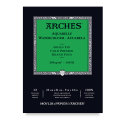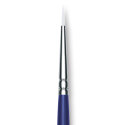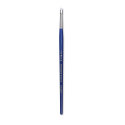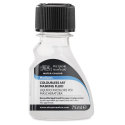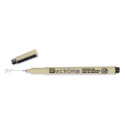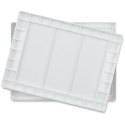Watercolor Supplies
Want to know what I use to create my paintings? Read about all the supplies I use below. Every section has links to purchase the exact supplies through my favorite art store: Dick Blick Art Supplies. Their prices are the best around and they offer free US shipping with orders $69 or more! Or click below to start shopping using my affiliate link.
Professional Watercolor Paper
Hot-Pressed Paper: I love using Arches 140 lb. Hot Pressed paper for my pet portraits. The smooth surface allows me to use black micron pens to add details. I also find hot-pressed paper easier to work with after you scan it into your computer since you don’t have shadows appearing from the texture of the paper. For that reason, I also use hot-pressed paper when I want to create prints of my work.
Cold-Pressed Paper: I prefer using cold-pressed for my botanical art. The textured surface helps my paintings look natural and organic. Cold-pressed paper is also ideal for keeping your paper wet. I like to use cold-pressed paper when painting landscapes or botanical pieces with painting backgrounds.
Watercolor Blocks: Unlike pads of paper that you need to tape or stretch on a board before painting, watercolor blocks are ideal for a painter who likes to paint very wet. The papers are glued together and will hold their shape while you paint. When your painting dries, you cut it from the block of paper.
Blick Studio Watercolor Practice Paper: During some of our in-person classes, you might practice on a piece of Blick Student-grade paper. Although it dries faster than Arches and isn’t as durable, it is much more economic and a great way to practice techniques before painting on your nicer, more expensive paper.
Corrugated Plastic Panels to Paint On: These are the same plastic boards we paint on during in-person classes. You can cut them with a box cutter. Use a frog tape or a white Kiwihub tape to tape your 5x7 or 8x10 inch paper. I suggest learning how to stretch your watercolor paper if you plan on painting larger than 11x14 inches. (See Intermediate Art Supplies at the bottom of this page)
Professional Watercolor Paints
Daniel Smith Extra Fine Watercolors are excellent paints that will resist fading overtime. Although I create my own palette of colors by purchasing individual tubes of paint, you can also find pre-made pans of Daniel Smith colors.
See which colors I use for my Pet Portraits Here
See which colors I use for my Botanical Paintings Here
See which colors are in your black tin for my In-Person Classes Here
Student Grade Watercolor Paints
Winsor & Newton Cotman Travel Tin of 24 half pans: Not ready to spend the big $ on professional watercolor paints? Student-grade paints might be a better option for you. I suggest using Winsor & Newton Cotman watercolors as your starter set. They have a variety of pre-filled tins so you can start your watercolor journey without breaking the bank.
Watercolor Brushes
I’m not joking when I say that I only use ONE brush for all of my paintings- either a Black Velvet round size 04 or 06. This brush holds enough water for large areas, but it also has a tip fine enough for details. I love my brush and know you will too.
Painting an even wash in a sky, or in any large area, is much easier with the correct brush. You can use either a mop or a quill brush for this job. It holds a massive amount of water. I like using the Silver Brush Atelier Quill Series Golden Taklon Brushes. In your in-person kits, there is a size 60 quill brush; however, you can get much larger quill brushes for larger projects.
Small Detail Brush: Round Size 0
A small detail brush is essential for those tight spots. You use Blick Scholastic Short Handle Wonder White Brush - Round, Size 0 in your watercolor kits for in-person classes.
Wet a scrubber brush with clean water and use it to scrub out an accidental splash of color on a white section, or to clean up a messy edge. The bristles are shorter and coarser to allow you to scrub. Just be careful to not scrub a section too much or you might rip the paper.
This long and skinny brush holds a lot of liquid and comes to a fine point. Also known as a script or liner brush, riggers are used for long, thin lines. I like to use them for painting white whiskers using Dr. Ph Martin’s bleed Proof White (pictured below).
These brushes are unique because you can detach the handle and use it to cover your brush bristles while traveling. Perfect for plein air painting, or for packing your favorite brush for a trip to the cabin.
Watercolor Accessories
Sakura Pigma Micron Pen, Black, size 03: I use this pen to add sharp details or for my line and wash watercolors.
Watercolor Palette: If you are creating your own palette, choose one that is stain-resistant. Porcelain is always superior.
Dr. Ph Martin’s Bleed Proof White: Use this opaque gouache to add white details after you paint.
Brush holder: Make sure to keep your brushes upside down as they dry to avoid handle rot.
Sennelier Fine Point Masking Fluid: Use this fine point applicator to mask very thin lines such as leaf stems or whiskers.
Extra Fine Calligraphy nib: I use a pen and nib for applying masking fluid to my pet portrait whiskers. Use caution to not rip your paper- practice first.
Daniel Smith Watercolor Dot Cards: Test out 266 Watercolor and 22 Gouache colors before you buy the tubes or pans! I tested out these colors before I created my current watercolor palette.
Watercolor Colored Pencils: An alternative to paint, these watercolor pencils are great for traveling.
Beam Watercolors: This indigenous watercolor brand practices sustainability with their watercolors.
Pictured: Northern lights set
Hake brush: 2 inch: Hake brushes are perfect for wetting paper or large washes.
Roll-up Brush Pouch: Use this bag to safely store your brushes while you travel or while stored at your home.
Good lighting is key
This phone holder also has a ring light built into the clip. This means that you don’t get any funny shadows when you take pictures or videos of your work. I also love that the phone clip swivels so that you can take videos in landscape mode. I film all of my SkillShare classes, Instagram reels, and shoot all of my product photography with this light.
And now you can get 10% of your own by using the coupon code: EMILY10 at checkout!
How do you Sketch your images?
I use an app that I downloaded on my phone called: Da Vinci Eye to trace pet portraits and other botanical pictures I take. Sketching out your subject takes a long time and a lot of practice. Using an app or another tracing tool will get you to the painting step a lot sooner. Da Vinci Eye is a monthly subscription, but by signing up with the link below, you can get 20% off your first year subscription!
Get 20% off my first year subscription of Da Vinci Eye!
Although I am an affiliate with Da Vinci Eye and I do make a small commission through the link above, I wouldn’t support a product that I don’t use regularly in my studio!
Watercolor Supplies for Intermediate Painters/ Home Studios
Ampersand Aquabord: Do you want to paint on a hard surface? Then maybe aquabords are right for you! These boards come primed and ready to paint on. They come in a variety of sizes and will not bend or curl like watercolor paper. There are some differences compared to painting on watercolor paper, so I suggest testing out a few smaller sized boards first.
Full Sheets of Arches Cold-Pressed, 140 lbs Paper for Stretching: Painting larger paintings is an exciting challenge! You can purchase full sheets of watercolor paper from Arches and then use them whole, or cut them in half. If you are using 140 lbs paper, you’ll need to stretch it to paint on a full sheet. I like to use a Grafix artboard for stretching my paper (see below). If you don’t want to stretch your paper, you’ll need to purchase a higher weight, like a 300 lbs. paper.
Grafix Incredible Art Board: Use this foam art board for stretching your full sheet watercolor paper. You’ll need to submerge your watercolor paper in clean water (use a bathtub or a plastic tote). When it is fully wet and submerged, transfer it to your art board. Use wetted gum tape around all four edges and then staple over the gum tape and through the watercolor paper while wet. This allows your paper to shrink as it dries and will leave you with a firm surface to paint on. You’ll have to use a box cutter to cut your paper off your board. You can use both sides of the this art board and reuse it over and over again!
Gum Tape for Stretching Watercolor Paper: Use this brown kraft tape to stretch your watercolor sheets. Cut it to the length you need it, then wet and place along your paper edge. I staple both down too for added strength. This is a massive amount of gum tape and will last you a lifetime!
Linen Hinging Tape for Taping your Watercolor Paintings to mats and backings: I use this brand of linen tape to tape my watercolor paintings to my matboards for framing. You only need a piece along the top as you want your painting to be able to expand and move with time. This tape is acid free so it won’t yellow your paper. It is also easy to remove.
Dorland’s Wax Medium to Seal your Watercolor Paintings: If you aren’t going to frame your paintings behind glass, you might need to protect them with a layer of wax medium. I use this wax to seal my watercolor greeting cards so I can send them in the mail without worrying. Use a paper towel to grab a quarter size of wax, then use a circular motion to apply it over your dry painting.
Daniel Smith Watercolor Ground: Paint a layer or two of this clear watercolor ground to a surface to turn it into a paintable surface for watercolors. I used this clear watercolor ground to paint on charcuterie boards. The paint won’t react exactly like it does on paper, but it’s fun to experiment painting on different surfaces.



